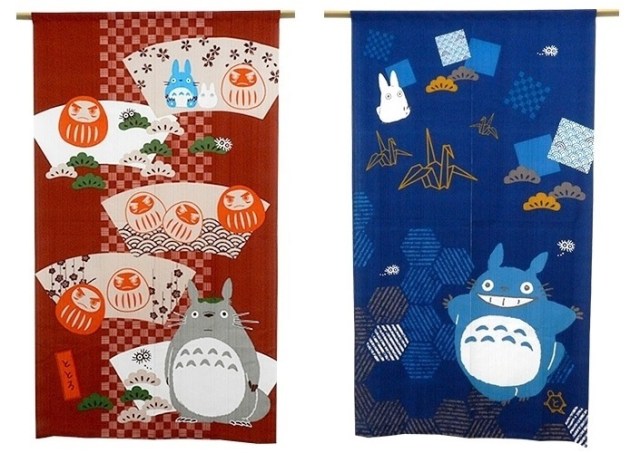
Four different designs bursting with adorable Ghibli characters and good-luck symbols from Japanese culture.
It’s hard to imagine any fan of Studio Ghibli, or just cuteness in general, being averse to the idea of adding a little more Totoro to their home interior motif. And if that extra dash of Totoro aesthetics should also help usher good luck and good fortune into your home, so much the better, right?
So it’s good to know that Ghibli specialty shop Donguri Kyowakoku has a whole line of good-luck Totoro tapestries on offer right now.
In Japanese, Donguri Kyowakoku calls them the Fukumaneki (“prosperity-becoking”) noren series. Noren are a type of split curtain hung in the entryway of old-school shops and restaurants in Japan, but these ones are sold un-cut, since the designers realize that rather than place them in a doorway, you might prefer to use them as decorative tapestries against a flat wall.
There are a total of four Fukumaneki designs, each with their own traditional Japanese good-luck symbols, starting with this gourd pattern. The exact way by which gourds became symbols of good luck in Japanese culture is a little hazy, with theories ranging from their widening shape being a visual metaphor for growing prosperity to a famous samurai general’s custom of incorporating gourds into his banner following important victories, but they’re widely considered an auspicious item.
Next is a crane and tortoise pattern.
Due to the animals’ long life spans, cranes and tortoises are seen as symbols of longevity in Japan, with the connected expectation of a healthy and happy life. The origami renderings here have a double meaning, as they’re associated with the belief that folding 1,000 paper cranes, as a sign of dedication and determination, will grant you a wish.
The tortoise has its back marked with the hiragana character “to” (と), which also happens to be the first character uses in writing Totoro’s name.
An especially dense collection of good-luck symbols is featured on the kozuchi, or wooden mallet, noren.
Within Japanese folklore, Daikoku, a deity with dominion over wealth and prosperity, is depicted holding a magical mallet that, when swung, can produce riches. So in addition to the mallet, this noren is decorated with koban (oval-shaped gold coins used in the olden days of Japanese history).
You’ll spot a few fans too, which by nature of how they unfold, represent the opening of possibilities and spreading of good fortune.
The last Fukumaneki noren is covered with daruma wishing dolls.
Daruma wishing dolls are sold with both eyes blank. Upon purchasing them, you make a wish and paint in one eye, then when that wish comes true, you paint in the other. The noren’s designers figure you probably don’t want to go painting a cloth, so they seem to have split the difference by including daruma both with and without their eyes colored in, though we suppose that means that if you could still paint in the blank ones if you’re a daruma fundamentalist.
The Fukumaneki noren all measure 85 centimeters (33.5 inches) across and 150 centimeters in length, and are priced at 3,278 yen (US$22). Alternatively, if you’re looking for something that won’t take up quite as much space in your home or budget, there’s also a fuji (wisteria) Totoro noren that’s the same width but only 90 centimeters long for 2,178 yen.
This one doesn’t include any sort of good-luck symbols, but you could make the argument that if you’ve got three Totoros in your house, things are going pretty well, right?
Thanks to a recent restock, all of the designs can be ordered through the Donguri Kyowakoku online shop (gourd here, crane and turtle here, mallet here, daruma here, and wisteria here) and help you get 2025 off to a lucky start.
Source: Donguri Kyowakoku
Top image: Donguri Kyowakoku (1, 2)
Insert images: Donguri Kyowakoku (1, 2, 3, 4, 5)
● Want to hear about SoraNews24’s latest articles as soon as they’re published? Follow us on Facebook and Twitter!

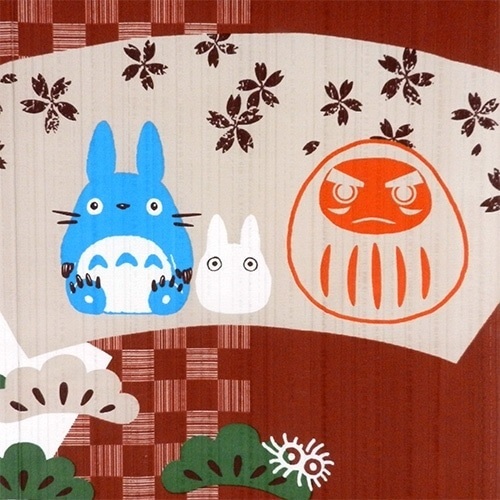

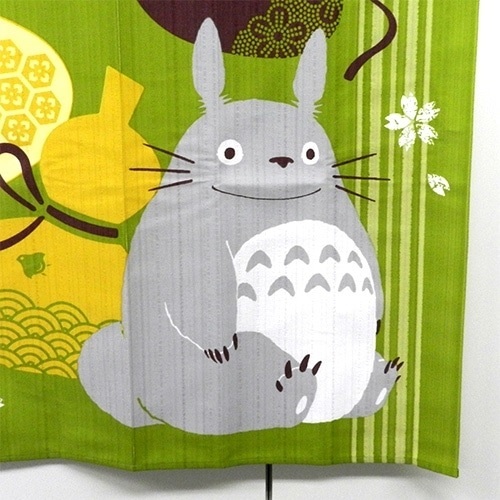
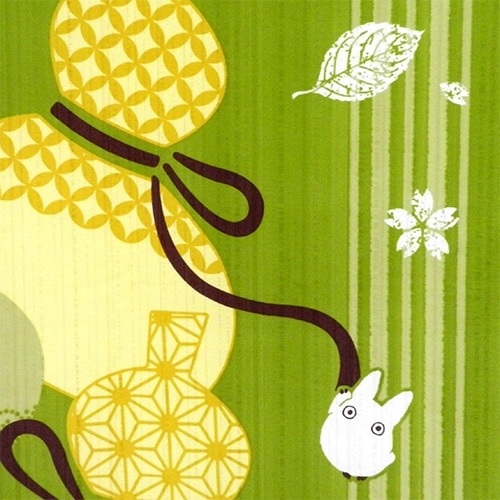
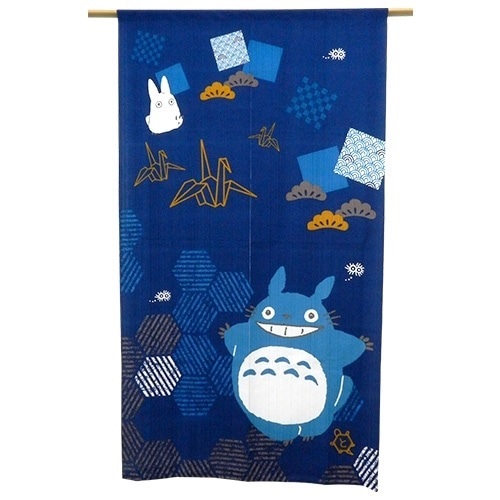
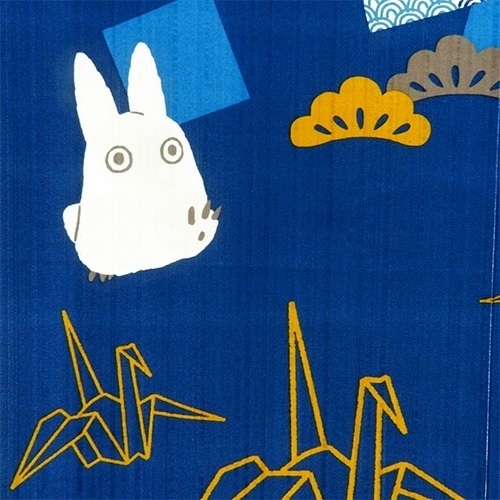
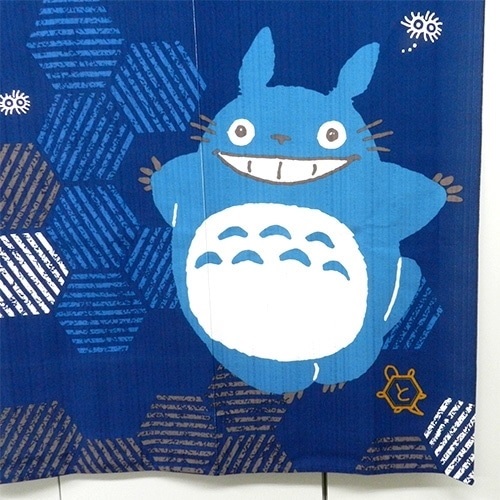
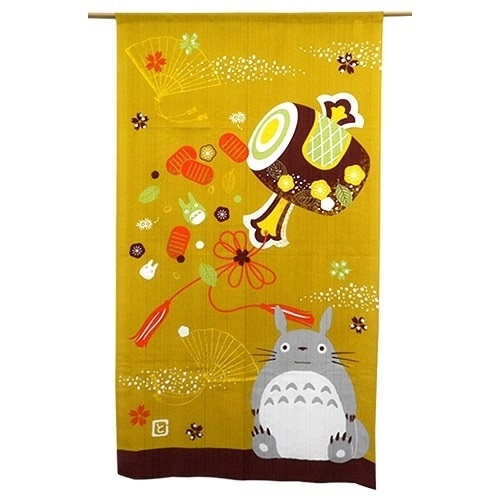
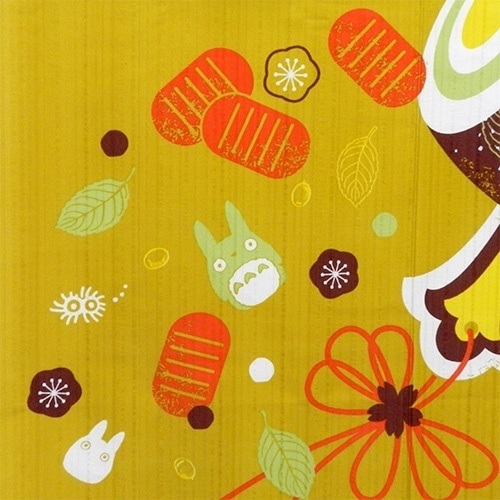
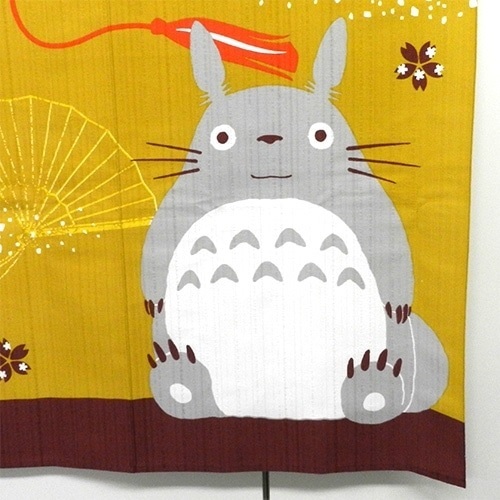
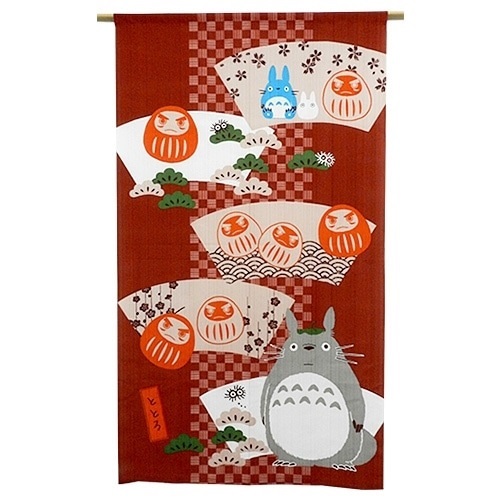
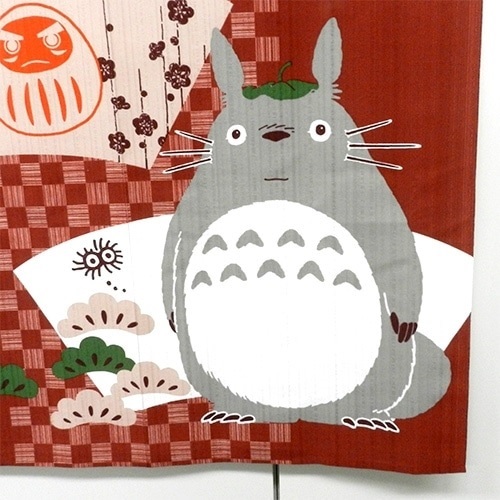
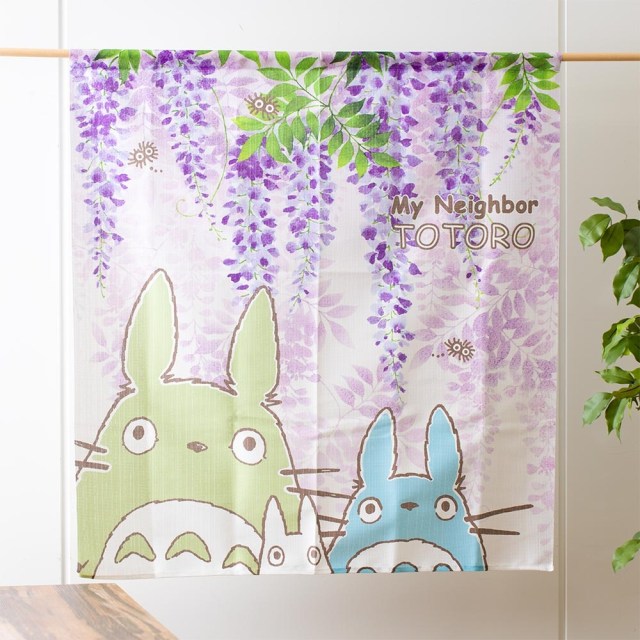

 Totoro tapestry noren are ready to welcome you to winter (or whichever other season you like)
Totoro tapestry noren are ready to welcome you to winter (or whichever other season you like) Usher good luck into your home this New Year with Totoro tenugui from Studio Ghibli
Usher good luck into your home this New Year with Totoro tenugui from Studio Ghibli Totoro, Spirited Away tenugui tapestries promise good luck at New Year’s, smiles all the time【Pics】
Totoro, Spirited Away tenugui tapestries promise good luck at New Year’s, smiles all the time【Pics】 Studio Ghibli noren hanging art puts the path to Spirited Away in your home【Photos】
Studio Ghibli noren hanging art puts the path to Spirited Away in your home【Photos】 Japan Extreme Budget Travel! A trip from Tokyo to Izumo for just 30,000 yen [Part 2]
Japan Extreme Budget Travel! A trip from Tokyo to Izumo for just 30,000 yen [Part 2] Japanese restaurant chain serves Dragon Ball donuts and Senzu Beans this spring
Japanese restaurant chain serves Dragon Ball donuts and Senzu Beans this spring Starbucks Japan releases first-ever Hinamatsuri Girls’ Day Frappuccino
Starbucks Japan releases first-ever Hinamatsuri Girls’ Day Frappuccino Drift ice in Japan is a disappearing winter miracle you need to see now
Drift ice in Japan is a disappearing winter miracle you need to see now Japan’s craziest burger chain takes menchi katsu to new extreme levels
Japan’s craziest burger chain takes menchi katsu to new extreme levels Fives places around Japan to appreciate the plum blossoms this season
Fives places around Japan to appreciate the plum blossoms this season Which convenience store onigiri rice balls are the most popular? Survey reveals surprising results
Which convenience store onigiri rice balls are the most popular? Survey reveals surprising results Naruto and Converse team up for new line of shinobi sneakers[Photos]
Naruto and Converse team up for new line of shinobi sneakers[Photos]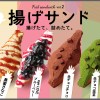 Fried sandwiches arrive in Tokyo, become hot topic on social media
Fried sandwiches arrive in Tokyo, become hot topic on social media Japan has a new bar just for people thinking about quitting their jobs, and the drinks are free
Japan has a new bar just for people thinking about quitting their jobs, and the drinks are free Highest Starbucks in Japan set to open this spring in the Tokyo sky
Highest Starbucks in Japan set to open this spring in the Tokyo sky The 10 most annoying things foreign tourists do on Japanese trains, according to locals
The 10 most annoying things foreign tourists do on Japanese trains, according to locals Tokyo Skytree turns pink for the cherry blossom season
Tokyo Skytree turns pink for the cherry blossom season Yakuzen ramen restaurant in Tokyo is very different to a yakuza ramen restaurant
Yakuzen ramen restaurant in Tokyo is very different to a yakuza ramen restaurant Shibuya Station’s Hachiko Gate and Yamanote Line stairway locations change next month
Shibuya Station’s Hachiko Gate and Yamanote Line stairway locations change next month Starbucks Japan releases new sakura goods and drinkware for cherry blossom season 2026
Starbucks Japan releases new sakura goods and drinkware for cherry blossom season 2026 Starbucks Japan adds new sakura Frappuccino and cherry blossom drinks to the menu
Starbucks Japan adds new sakura Frappuccino and cherry blossom drinks to the menu Japan Extreme Budget Travel! A trip from Tokyo to Izumo for just 30,000 yen [Part 1]
Japan Extreme Budget Travel! A trip from Tokyo to Izumo for just 30,000 yen [Part 1] Japan’s new “Cunte” contact lenses aren’t pronounced like you’re probably thinking they are
Japan’s new “Cunte” contact lenses aren’t pronounced like you’re probably thinking they are Japan’s newest Shinkansen has no seats…or passengers [Video]
Japan’s newest Shinkansen has no seats…or passengers [Video] Foreigners accounting for over 80 percent of off-course skiers needing rescue in Japan’s Hokkaido
Foreigners accounting for over 80 percent of off-course skiers needing rescue in Japan’s Hokkaido Super-salty pizza sends six kids to the hospital in Japan, linguistics blamed
Super-salty pizza sends six kids to the hospital in Japan, linguistics blamed Starbucks Japan unveils new sakura Frappuccino for cherry blossom season 2026
Starbucks Japan unveils new sakura Frappuccino for cherry blossom season 2026 Foreign tourists in Japan will get free Shinkansen tickets to promote regional tourism
Foreign tourists in Japan will get free Shinkansen tickets to promote regional tourism Take a trip to Japan’s Dododo Land, the most irritating place on Earth
Take a trip to Japan’s Dododo Land, the most irritating place on Earth Is China’s don’t-go-to-Japan warning affecting the lines at a popular Tokyo gyukatsu restaurant?
Is China’s don’t-go-to-Japan warning affecting the lines at a popular Tokyo gyukatsu restaurant? Survey asks foreign tourists what bothered them in Japan, more than half gave same answer
Survey asks foreign tourists what bothered them in Japan, more than half gave same answer Japan’s human washing machines will go on sale to general public, demos to be held in Tokyo
Japan’s human washing machines will go on sale to general public, demos to be held in Tokyo Starbucks Japan releases new drinkware and goods for Valentine’s Day
Starbucks Japan releases new drinkware and goods for Valentine’s Day We deeply regret going into this tunnel on our walk in the mountains of Japan
We deeply regret going into this tunnel on our walk in the mountains of Japan Studio Ghibli releases Kodama forest spirits from Princess Mononoke to light up your home
Studio Ghibli releases Kodama forest spirits from Princess Mononoke to light up your home Major Japanese hotel chain says reservations via overseas booking sites may not be valid
Major Japanese hotel chain says reservations via overseas booking sites may not be valid Put sesame oil in your coffee? Japanese maker says it’s the best way to start your day【Taste test】
Put sesame oil in your coffee? Japanese maker says it’s the best way to start your day【Taste test】 No more using real katana for tourism activities, Japan’s National Police Agency says
No more using real katana for tourism activities, Japan’s National Police Agency says Adorable Totoro acorn key holders come with a special guest hidden inside[Photos]
Adorable Totoro acorn key holders come with a special guest hidden inside[Photos] Totoro ceramic dishware will have your kitchen looking Ghibli elegant in 2025 and beyond【Pics】
Totoro ceramic dishware will have your kitchen looking Ghibli elegant in 2025 and beyond【Pics】 With hand-painted faces, no two Totoro kamikogei traditional papercraft figures are the same
With hand-painted faces, no two Totoro kamikogei traditional papercraft figures are the same Totoro towels gently glow in the dark to set the Ghibli nighttime mood in your home【Photos】
Totoro towels gently glow in the dark to set the Ghibli nighttime mood in your home【Photos】 Daruma dolls now in 30 different colors to decorate your homes and bring you good luck
Daruma dolls now in 30 different colors to decorate your homes and bring you good luck Not just a Big Totoro, but a Super Extra-large Big Totoro plushie could be in your home right now
Not just a Big Totoro, but a Super Extra-large Big Totoro plushie could be in your home right now Studio Ghibli holiday wreath adds a touch of Kiki cuteness and good fortune to your home【Photos】
Studio Ghibli holiday wreath adds a touch of Kiki cuteness and good fortune to your home【Photos】 Totoro and Catbus bath mats are here to keep your floor dry and your home Ghibli-adorable【Photos】
Totoro and Catbus bath mats are here to keep your floor dry and your home Ghibli-adorable【Photos】 Two beautiful Totoro Catbus interior piece figures scamper back to the Studio Ghibli store【Pics】
Two beautiful Totoro Catbus interior piece figures scamper back to the Studio Ghibli store【Pics】 Totoro log plushie pouches, clear-tummy bags are here to adorably hold your most important stuff
Totoro log plushie pouches, clear-tummy bags are here to adorably hold your most important stuff Totoro Mini Pouches are enormously cute【Photos】
Totoro Mini Pouches are enormously cute【Photos】 Next stop for the Totoro Catbus: Your home, thanks to Ghibli magnets【Photos】
Next stop for the Totoro Catbus: Your home, thanks to Ghibli magnets【Photos】 Totoro, Spirited Away mamezara dishes ready to grace the tables of Studio Ghibli anime fans【Pics】
Totoro, Spirited Away mamezara dishes ready to grace the tables of Studio Ghibli anime fans【Pics】 Studio Ghibli music boxes bring anime music from My Neighbour Totoro into your home
Studio Ghibli music boxes bring anime music from My Neighbour Totoro into your home Snowman Totoro, other self-righting dolls never stay down, will always keep your spirits up【Pics】
Snowman Totoro, other self-righting dolls never stay down, will always keep your spirits up【Pics】 Studio Ghibli diorama boxes are much more beautiful than your elementary school art project【Pics】
Studio Ghibli diorama boxes are much more beautiful than your elementary school art project【Pics】 Totoro travel bags, suitcase ready to take responsibility for inspiring your Japanese countryside trip
Totoro travel bags, suitcase ready to take responsibility for inspiring your Japanese countryside trip